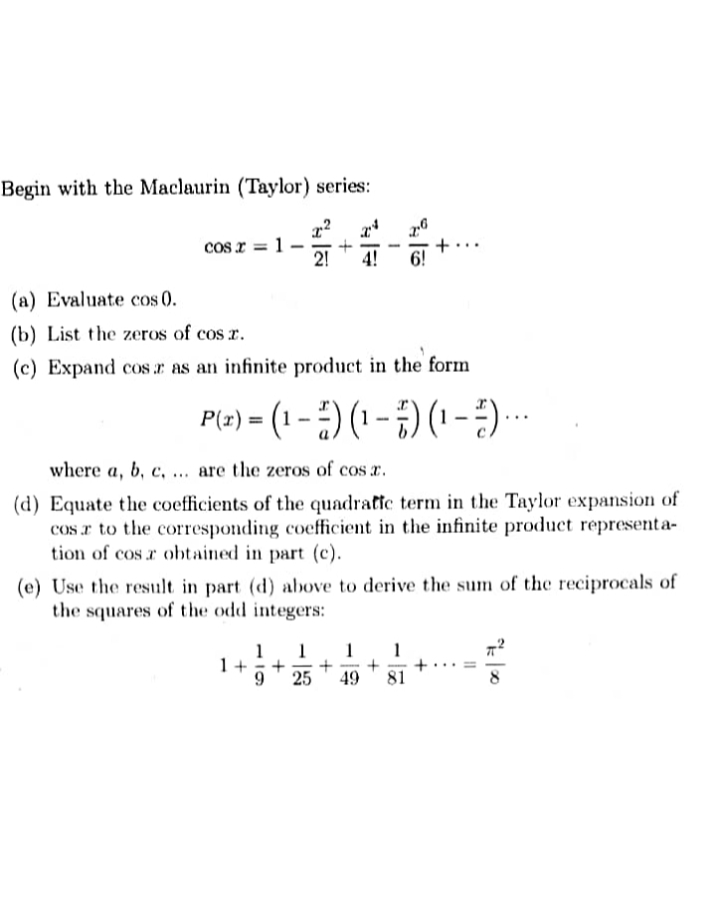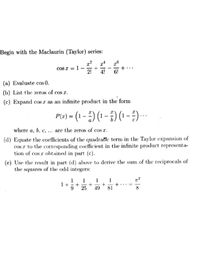Begin with the Maclaurin (Taylor) series: cos r = 1 - 2! 4! 6! (a) Evaluate cos 0. (b) List the zeros of cos r. (c) Expand cos r as an infinite product in the form Pla) = (1 - ) (1 - #) (1 -). where a, b, c, ... are the zeros of cos r.
Begin with the Maclaurin (Taylor) series: cos r = 1 - 2! 4! 6! (a) Evaluate cos 0. (b) List the zeros of cos r. (c) Expand cos r as an infinite product in the form Pla) = (1 - ) (1 - #) (1 -). where a, b, c, ... are the zeros of cos r.
Algebra & Trigonometry with Analytic Geometry
13th Edition
ISBN:9781133382119
Author:Swokowski
Publisher:Swokowski
Chapter10: Sequences, Series, And Probability
Section10.1: Infinite Sequences And Summation Notation
Problem 74E
Related questions
Question
Need step by step solution for the problem

Transcribed Image Text:Begin with the Maclaurin (Taylor) series:
cos r = 1 –
2!
4!
6!
(a) Evaluate cos 0.
(b) List the zeros of cos r.
(c) Expand cos r as an infinite product in the form
P(2) = (1 - 4) (1 - #) (1 - ).--
where a, b, c,... are the zeros of cos r.
(d) Equate the coefficients of the quadratic term in the Taylor expansion of
cos r to the corresponding coefficient in the infinite product representa-
tion of cos r obtained in part (c).
(e) Use the result in part (d) above to derive the sum of the reciprocals of
the squares of the odd integers:
1
1
+
9.
1+
+
81
+
25
49
Expert Solution
This question has been solved!
Explore an expertly crafted, step-by-step solution for a thorough understanding of key concepts.
Step by step
Solved in 3 steps with 2 images

Follow-up Questions
Read through expert solutions to related follow-up questions below.
Follow-up Question
Kindly answer parts d and e too . I need answer as soon as possible

Transcribed Image Text:Begin with the Maclaurin (Taylor) series:
x²
2-6
-
cos .r = 1.
2!
4! 6!
(a) Evaluate cos 0.
(b) List the zeros of cos r.
(c) Expand cos e as an infinite product in the form
P(x) = (1 - ) (¹ - ) (¹-2)...
where a, b, c, ... are the zeros of cos.z.
(d) Equate the coefficients of the quadratic term in the Taylor expansion of
cos r to the corresponding coefficient in the infinite product representa-
tion of cos z obtained in part (c).
(e) Use the result in part (d) above to derive the sum of the reciprocals of
the squares of the odd integers:
1
1
1+ +
+ +
9 25 49
+
앗 100
11
Solution
Recommended textbooks for you

Algebra & Trigonometry with Analytic Geometry
Algebra
ISBN:
9781133382119
Author:
Swokowski
Publisher:
Cengage

Linear Algebra: A Modern Introduction
Algebra
ISBN:
9781285463247
Author:
David Poole
Publisher:
Cengage Learning


Algebra & Trigonometry with Analytic Geometry
Algebra
ISBN:
9781133382119
Author:
Swokowski
Publisher:
Cengage

Linear Algebra: A Modern Introduction
Algebra
ISBN:
9781285463247
Author:
David Poole
Publisher:
Cengage Learning
